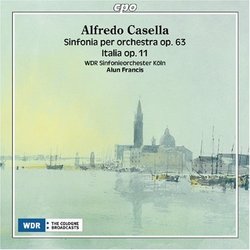| All Artists: Alfredo Casella, Alun Francis, WDR Sinfonieorchester Köln, WDR Sinfonie Orchester Köln Title: Alfredo Casella: Sinfonia per Orchestra, Op. 63; Italia, Op. 11 Members Wishing: 0 Total Copies: 0 Label: Cpo Records Original Release Date: 1/1/2009 Re-Release Date: 8/25/2009 Genre: Classical Style: Symphonies Number of Discs: 1 SwapaCD Credits: 1 UPC: 761203726523 |
Search - Alfredo Casella, Alun Francis, WDR Sinfonieorchester Köln :: Alfredo Casella: Sinfonia per Orchestra, Op. 63; Italia, Op. 11
 | Alfredo Casella, Alun Francis, WDR Sinfonieorchester Köln Alfredo Casella: Sinfonia per Orchestra, Op. 63; Italia, Op. 11 Genre: Classical |
Larger Image |
CD Details |
CD ReviewsAlfredo Who? J Scott Morrison | Middlebury VT, USA | 09/24/2009 (4 out of 5 stars) "Back when the world was young and I was a freshman in college I heard a concert that featured the Piano Trio of a composer named Alfredo Casella (1883-1947). I was blown away by it. In my innocence I thought his was a name that every classical music lover knew. It turns out the main reason that piece was on a concert at my university was that the translator into English of Casella's memoirs was a professor at the school, and indeed he was the pianist in that performance. And the university's press was the publisher. It was only later that I realized that very few people knew of Casella and even fewer knew any of his music. This was not always the case. Indeed, the symphony on the present CD was commissioned by the Chicago Symphony for the 1941 celebration of the fiftieth anniversary of the orchestra's founding. (There were also commissioned works by William Walton, Zoltán Kodály, Darius Milhaud, Reinhold Gliere and Nikolai Myaskovsky as well as the orchestra's legendary conductor, Frederick Stock.) The symphony was a great success and within a short time had been played by the orchestra of the Accademia di Santa Cecilia in Rome, the Dresden Staatskapelle and the Vienna Philharmonic. Then it more or less dropped from sight. This recording is its first. The piece, late in Casella's career, is neoclassic, somewhat astringent but both lyrical and beautifully orchestrated. It is in the usual four movements. Its second movement, Andante molto moderato quasi adagio, is particularly fine with its meltingly lovely string melodies played against expert countermelodies in brass and winds. The Scherzo is frenzied and angry but ultimately triumphant. The Rondo finale continues in that mode and brings the whole thing to a stirring conclusion.
Filling out the CD is a performance of an early work, Italia, which is possibly Casella's most often played orchestral piece. Written in 1909, it is a twenty-minute long rhapsody steeped in Italian nationalism and makes much use of Italian folksong as well as, in the final moments, Luigi Denza's 'Funiculi, Funicula'. It could hardly be more different from the Symphony in that, although one hears similar orchestration, 'Italia' is clearly designed to be a potpourri of sorts that evokes both the southern and northern Italian ethos whereas the Symphony could not immediately be recognized as Italian at all. In the almost operatic 'Italia' one experiences a Good Friday procession, a haunting English horn lament, snatches of Neapolitan song, a febrile dramatic scene and finally a joyous and rousing song. It cannot be said that the performances of the WDR Sinfonieorchester Köln under conductor Alun Francis are the last word in suavity or perfect ensemble and tuning, but one certainly gets a more than passable idea of the value of these two very different works. Scott Morrison" |
